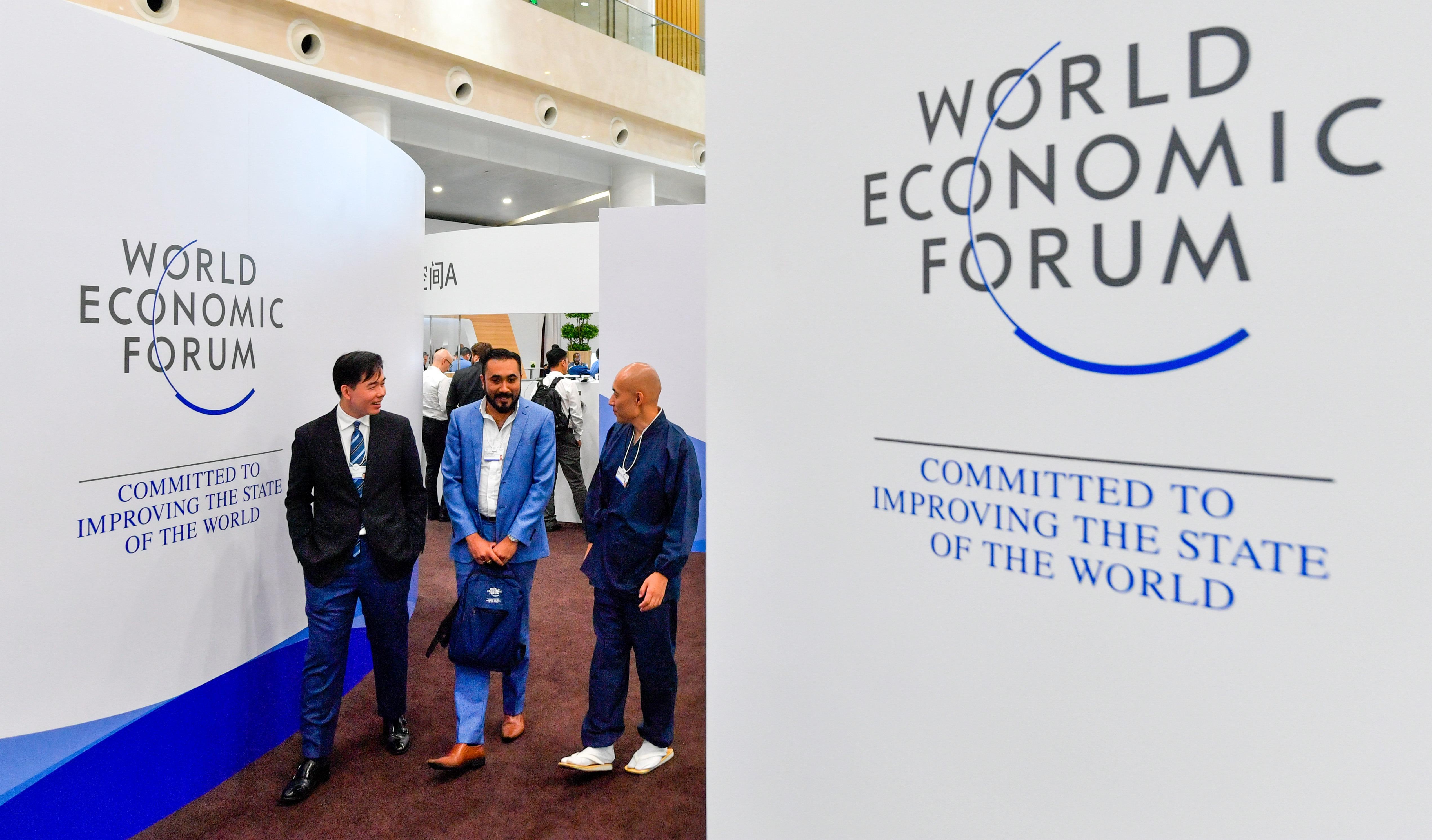Experts expect much more on the policy front to secure future of firms, economy
 Visitors interact with each other during the 14th Annual Meeting of the New Champions, also known as the Summer Davos Forum, in Tianjin on June 27. (PHOTO / XINHUA)
Visitors interact with each other during the 14th Annual Meeting of the New Champions, also known as the Summer Davos Forum, in Tianjin on June 27. (PHOTO / XINHUA)
Confidence in China's economic growth remains strong among officials, economists and global entrepreneurs, as the world's second-largest economy is well on track for a steady and gradual recovery despite headwinds.
They said they are optimistic about China's capability to achieve its preset annual growth target of around 5 percent this year as well as sustainable and high-quality development in the long run. China, they said, will be a key growth engine for the rest of the world.
"While we see some financial challenges globally, which will no doubt affect all economies, the reality is we still see positive growth for our business in China," said Bruce Cameron, chairman of Zespri, a cooperative of kiwi fruit growers in New Zealand.
"When I look at the future opportunities that we have, we remain confident that we can continue to grow as we seek to expand to more provinces and more cities and penetrate deeper into those markets," Cameron told China Daily on the sidelines of the 14th Annual Meeting of the New Champions, also known as the Summer Davos Forum, which concluded on June 29 in Tianjin.
Given that "the Chinese economy will continue to be resilient", Zespri will continue to invest in the China market to further cater to local consumers' need for better products, he said.
"We see China as a very long-term global market. We have no intentions of backtracking or leaving China. We are embedded here. We believe that our company and our presence here take us forward over the foreseeable future with strong growth."
He also said China's economic growth rate is still "very impressive "compared to that of the rest of the world. The Chinese economy, he said, has the ability to continue to have a strong presence globally.
Fitch Ratings recently raised China's 2023 GDP forecast from 5.2 percent to 5.6 percent after a swifter-than-expected rebound in the first quarter.
China's GDP expanded by 4.5 percent year-on-year in the first quarter, compared to an estimated 2.8 percent in a previous report issued by Fitch Ratings in March. Consumption, property sales and exports all recovered rapidly in February and March, said the credit ratings agency.
Although the country's monthly macro data for April and May showed that key indicators had slowed, the broader picture of a growth recovery driven by the normalization of consumer spending looks intact. Retail sales continued to expand robustly in May.
 Visitors take pictures of the night view of Tientsin Eye Ferris wheel during the Summer Davos Forum in Tianjin on June 29. (PHOTO / CHINA NEWS SERVICE)
Visitors take pictures of the night view of Tientsin Eye Ferris wheel during the Summer Davos Forum in Tianjin on June 29. (PHOTO / CHINA NEWS SERVICE)
Joe Ngai, chairman of management consultancy McKinsey China, said China is gradually coming out of the COVID-19 pandemic impact, and the rebound will come at a more moderate pace than expected amid the current supply and demand imbalance.
Data released by the National Bureau of Statistics at the end of June showed the latest official snapshot of the pressures facing the economy, with the official PMI for China's manufacturing sector remaining in the contraction zone for the third consecutive month amid still-weak demand, albeit ticking up to 49 in June from 48.8 in May.
China's non-manufacturing PMI, however, fell to 53.2 in June from 54.5 in May, according to the NBS.
Despite the pressures and challenges, the economy will likely to recover steadily in the second half of the year, with improvement in key fields like consumption and in-person services, Ngai said.
"I still believe the next China is China," he said. "After looking at the global context and where we are right now, there is no other place in the world that has the size (of China) and is still growing at the same rates we're seeing in China."
After years of rapid growth, China will enter a new stage of moderate growth and high-quality development, continuously serving as a growth engine for the rest of the world, he said. "The Chinese market has also been a major growth segment for global companies."
He said the private sector serves as the most resilient part of the economy as many of its constituent companies have built solid strength in emerging sectors like the internet and electric vehicles. Meanwhile, China's ongoing efforts to expand opening-up will bring new technologies and high-quality products as well as allow foreign investors to develop in China's ultra-large domestic market, thus benefiting Chinese firms, consumers and foreign companies.
"There are good signs of recovery for the Chinese economy in many ways … I am very optimistic about… how China is performing," said Frank Bournois, vice-president and dean of China Europe International Business School. "The resilience of the country and the ability of people inside companies to be agile will also be strong factors supporting the stability of the renminbi exchange rate."
Looking ahead, China's economic growth data for the second quarter are scheduled to be released on July 17. GDP growth is estimated to be higher than that in the first quarter given the lower base of the previous year and the steady recovery trend, followed by steady growth in the third and fourth quarters, officials and economists said.
 A visitor peruses information on Tiankai Higher Education Innovation Park during the Summer Davos Forum in Tianjin on June 27. (PHOTO / CHINA NEWS SERVICE)
A visitor peruses information on Tiankai Higher Education Innovation Park during the Summer Davos Forum in Tianjin on June 27. (PHOTO / CHINA NEWS SERVICE)
Zhang Yuzhuo, chairman of the State-owned Assets Supervision and Administration Commission of the State Council, said China has maintained a steady economic recovery this year against the backdrop of multiple global challenges, and the growth is set to accelerate in the second quarter.
While it is generally believed that China's strong economic recovery has helped boost confidence in the global economy, Zhang also warned of challenges relating to fields such as the lower-than-expected growth in foreign trade.
He said during the Summer Davos Forum that more efforts should be made to create more new growth points for consumption as well as scale up some emerging sectors to generate a bigger impact.
His views were echoed by Peng Sen, president of the China Society of Economic Reform, who said the second-quarter GDP growth will be significantly higher than that of the first quarter given the low base of last year, followed by steady growth in the third and fourth quarters.
Peng said he believed China's current potential growth rate will be above 6 percent, attributing the recent difficulties to the blow of the pandemic and the sluggish investment and trade environment at both home and abroad.
To deal with the downward pressures facing the broader economy, he called for both macroeconomic policy support and medium- to long-term solutions, including expanding market-oriented reforms and high-level opening-up.
A recent State Council executive meeting chaired by Premier Li Qiang said China will adopt a raft of policy measures to sustain its economic recovery. The meeting explored a basket of policy measures with a special focus on enhancing macroeconomic policy adjustments, expanding effective demand, bolstering the real economy and preventing and defusing risks in key sectors.
The meeting called for efforts to keep abreast of the shifting economic situation. More vigorous measures must be taken to strengthen drivers of development and improve the economic structure, so as to sustain the sound momentum of the economic upturn.
Policymakers have been stepping up macroeconomic policy support that has already boosted the development of midsized and large companies. NBS data showed China's industrial firms narrowed profit declines for a third consecutive month in May.
Industrial firms with annual main business revenue of at least 20 million yuan ($2.76 million) each reported a 12.6 percent fall from a year ago, but the decline was 5.6 percentage points narrower than in April, according to the NBS.
On the full-year prospects, Zhu Min, vice-chairman of the China Center for International Economic Exchanges, said the policies will be more structured in terms of spurring consumption.
More efforts should be made to ensure the income growth rate is higher than that of GDP this year, continue to improve social safety nets in terms of pensions and accelerate urbanization across China, Zhu said.


